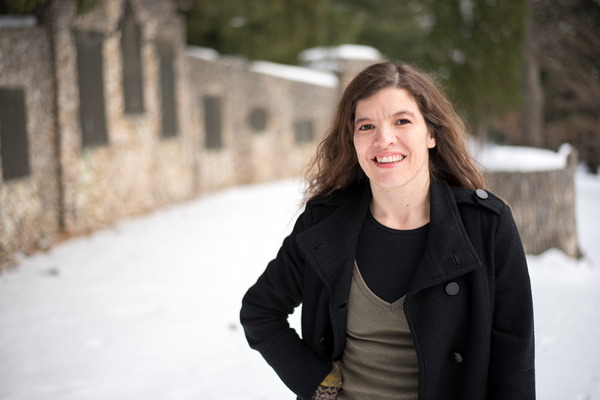Carrasco honored by Rachel Carson Center for Environment and Society in Germany
Luther College Associate Professor of Anthropology Anita Carrasco was granted the highly competitive, Writing Fellowship from the Rachel Carson Center for Environment and Society in Germany for a six-month residency. The Center accepts applications from faculty and researchers from all over the world, awarding fellowships to only 12 percent of applicants.
Regarding the award, Carrasco said she is "…still in awe. I never thought I could be awarded such a competitive fellowship, but I would not have forgiven myself if I did not at least try. You can't win the lottery if you don't buy tickets right? I am incredibly grateful for this opportunity and feel honored to be able to represent our college in Germany."
As part of the fellowship Carrasco will be in residence at the RCC in Munich, Germany. She will attend colloquia, present her research, attend and present at Works-in-Progress sessions and attend and lead discussions at the center.
Carrasco will work on writing her book "The Embrace of the Serpent: A Chronicle of Atacameño Life in the Face of Mining," at the Center during her sabbatical year (2018-19) from Luther.
She is studying changing perceptions of the relationship between a mining company and indigenous communities in northern Chile. During her field work, Carrasco heard stories from several village elders in the Andes about an American engineer from Anaconda Mining Company, a very kind "gringo" in their own words, who unlike other white people, remembered their names, asked them about their lives and loved to take pictures.
"My book demonstrates that the formation of a negative moral identity assigned to the mining company in the present does not derive from the perception that Atacameños have of the environmental impacts of mining. Expecting to find fierce criticism of the environmental impacts of mining and finding very few, I wondered, why Anaconda was remembered more for the jobs it gave than for the water it took," Carrasco said.
Following the center's central theme of "transformations in environment and society," she is exploring how American presence via Anaconda shaped the perceptions and expectations about mining expressed in the social memory of indigenous peoples in Atacama. Their stories reveal a contrast between their perception of a past when mining was human and generous by providing jobs to the natives and a present where they see mining as greedy and unfair only offering employment to formally educated and trained individuals that most natives cannot compete with.
"Shifting attention away from the environmental impacts of mining, what Atacameños highlighted the most was a sentimental longing for the times of Anaconda, and a heartfelt sense of injustice over the loss of an old relationship based on jobs and dignity that was replaced by a relationship tinted with corporate charity," Carrasco said.
The Fellowship will provide Carrasco the time needed to complete her book, "The Embrace of the Serpent."
Thanks to Luther's support and resources, and despite a teaching load of six courses per year, Carrasco has developed a publication record that has established her expertise in community relations with the mining industry and the significance of indigenous and industrial water rights in this relationship.
Her most recent publications include "A Biography of Water in Atacama, Chile: Two Indigenous Community's Responses to Mining Extractive Encroachments" in the Journal of Latin American and Caribbean Anthropology in 2016. Here she examined how corporations and indigenous peoples of the Andes in northern Chile clash over water. Drawing on Kopytoff's idea of "the biography of things," she examined an important issue faced by Atacameño indigenous people: the commoditization of water.
Other publications include "Jobs and Kindness: William E. Rudolph's Role in the Shaping of Perceptions of Mining-Community Relations in the Atacama, Chile" in The Extractive Industry & Society in 2015; and "Entre dos aguas: identidad moral en la relación entre corporaciones mineras y comunidades indígenas en el desierto de Atacama" in Chungara in 2014.
Carrasco joined the Luther faculty in 2011. She holds a Ph.D. in cultural anthropology and a master's degree in cultural applied anthropology from the University of Arizona, and she earned her bachelor's degree in anthropology from the Universidad Academia de Humanismo Christiano in Santiago, Chile.
Born in Chile, Carrasco was raised in the small mining town of El Salvador.
A national liberal arts college with an enrollment of 2,150, Luther offers an academic curriculum that leads to the Bachelor of Arts degree in more than 60 majors and pre-professional programs. For more information about Luther visit the college's website: http://www.luther.edu.




